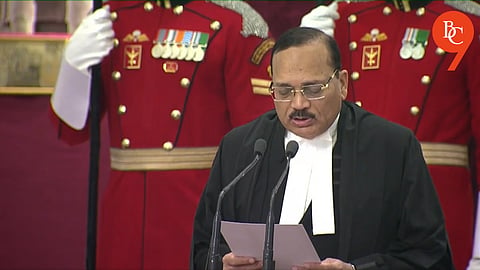

On Monday, Justice Surya Kant was sworn in as the 53rd Chief Justice of India, commencing a 14-month tenure leading the country’s judiciary. The oath was administered by President Droupadi Murmu at Rashtrapati Bhavan. He succeeds CJI Bhushan R. Gavai, who retired on Sunday after turning 65.
Previously, President Murmu appointed Justice Kant in accordance with Article 124(2) of the Constitution, based on the recommendation of the departing Chief Justice of India, Gavai, who adhered to the tradition of seniority in selecting his successor.
Justice Surya Kant has played a crucial role in several landmark rulings, including the abrogation of Article 370 that ended Jammu and Kashmir's special status, the revision of Bihar’s electoral rolls, and the Pegasus spyware case. Appointed as the 53rd Chief Justice of India on October 30, he will serve for nearly 15 months, demitting office on February 9, 2027, upon reaching the age of 65.
Born on February 10, 1962, in Hisar district of Haryana to a middle-class family, Justice Surya Kant rose from humble beginnings to India’s highest judicial office. He excelled academically, earning the distinction of standing ‘first class first’ in his Master’s degree in Law from Kurukshetra University in 2011.
Starting his career as a small-town lawyer, he made his mark at the Punjab and Haryana High Court, where he penned several notable judgments. He was appointed Chief Justice of Himachal Pradesh High Court on October 5, 2018, before being elevated to the Supreme Court.
He also contributed to the recent presidential reference regarding the powers of the Governor and President over state bills, a ruling expected to have nationwide implications.
Justice Surya Kant has played a key role in several high-profile cases, including nudging the Election Commission to disclose details of 65 lakh voters excluded from Bihar’s draft rolls, reinstating a woman sarpanch, reserving one-third of bar association seats for women, upholding One Rank-One Pension, and being part of benches on the Pegasus spyware case, the Aligarh Muslim University verdict, and security probes requiring judicial oversight.
